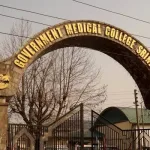Baramulla, Oct 11: Deputy Commissioner Baramulla Dr Syed Sehrish Asgar on Wednesday highlighted the nutritional richness of millet crops during a workshop held at the SKUAST-K’s Faculty of Agriculture Wadura Campus.
She underscored the workshop’s impact on the lives of poor and marginal millet farmers from rainfed areas, and urged for the commercialisation of medicinal and aromatic crops, saying millets, along with aromatic and medicinal crops, can sustain drylands, ensuring future food security amid worsening climatic conditions.
Dr Syed Sehrish, as the chief guest, inaugurated the workshop which was attended by experts including Prof Raihana H Kanth, Dean Faculty of Agriculture, Prof Amal Saxena, HoD Agronomy, and key officers from line departments. The workshop was aimed at shedding light on millets’ nutritional importance, their potential as alternative grains, and their role in food security and climate change mitigation.
Technical sessions held throughout the day covered vital topics such as varietal development in millets, health and nutritional benefits, the millets value chain, and sustainability amidst climate change challenges. Prof Raihana, in her address, emphasized how millets, once deemed inferior, are now recognized as “super grains” due to their immense health, economic, and environmental advantages.
Masrat Kar emphasised millets’ crucial role in the agri-food ecosystem, tracing their historical significance in Indian agriculture and their potential to combat lifestyle-related ailments. Yadvinder Singh underscored millets’ ability to offer balanced nutrition with reduced water and agro-input requirements.
Notably, Baramulla district distributed the highest quantity of millet seeds to farmers in 2023, indicating a growing emphasis on their cultivation in the region.





